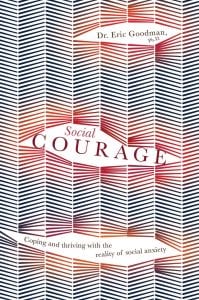Ahh, holiday parties! What a wonderful time of year for delicious treats and awkward small talk.

For someone struggling with high levels of social anxiety, that awkward small talk can feel like an insurmountable obstacle. The urge to come up with any excuse to avoid the festivities can be intense. Their anxiety will persistently try to coax them to skip the party and snuggle up at home with the holiday classics on Netflix, instead.
If social anxiety threatens to put a damper on your holiday spirit, there are steps you can take to make the best of a social anxiety season.
Anxiety is not Ebenezer Scrooge—looking to ruin your holiday for its own benefit. It isn’t your enemy trying to hurt you. Anxiety is a highly evolved inner alarm system designed to protect you from threats. Your anxiety speaks up out of a singular purpose—to protect you.
The problem is that it has the attributes of a bodyguard with the wisdom of a four-year-old who has consumed way too much caffeine and holiday candy. When it howls in social situations, it is activating your fight-or-flight response because it is misperceiving the situation to be a threat.
By understanding that it is trying to help in its very glitchy way, you can respond in a way that is more compassionate to your inner experience. Compassion in the face of anxiety allows you to make space for the discomfort rather than giving yourself additional anxiety about feeling anxious.
If your anxiety gets triggered in social situations, you have a choice. You can respond to the triggers as if they are actual threats (avoid, tighten your muscles, escape into alcohol, or stick close to a “safe” person) or you can respond as if it is safe. Your choice will either teach your inner four-year-old that the social event is actually a threat or it will teach your anxiety that there was no actual threat.
So, the holiday part season presents you with a question: Do you want to teach your brain that social situations are safe? If so, then move on to the next step.
As long as your anxiety believes socializing is a threat, it will continue to do its job—warning you of danger and triggering your fight-or-flight response during parties. You will continue to feel uncomfortable time and time again.
If, however, you invest in teaching your anxiety that socializing is safe, it will learn to quiet down over time. This involves facing your fear (going to parties and making small talk) without engaging in safety behaviors (relying on alcohol for liquid courage, staying close to a safe person, or being helpful in the kitchen as a way to remove yourself from the situation).
Yes, this will likely be uncomfortable, but remember, you are investing in the discomfort of facing your fears now so that in future social situations you’ll feel freer to show up and mingle without suffering. It is short term pain for long term gain.
Once you are in the anxious moment, note and acknowledge the anxiety (I am aware of anxiety right now) without getting into a wrestling match with it. In fact, it can be helpful to soften your muscles, remember to breathe, and allow yourself to gently flow along with the anxiety. If you resist the anxiety by tightening and holding your breath, you’ll only feel worse and communicate to anxiety that the party is a threat.
Try to stay in the moment as much as possible rather than getting sucked down the anxiety rumination rabbit hole in your mind. When you notice worry, acknowledge it and direct your attention back to the conversation and maybe a yummy dessert. Savor what little pleasures in the moment that you can notice without pressuring yourself to have a jolly old time.
Afterwards, rather than putting the event out of your mind, take note that although you were uncomfortable, nothing catastrophic happened and that you were able to tolerate the discomfort (even though it might have been unpleasant at times). See the victory in the steps you took and reward your bravery by giving yourself a pat on the back.
Then, seek out more opportunities to challenge yourself, rather than less. See them as learning opportunities for your anxiety that will pay off in the long run by suffering less at future parties and hopefully increasing positive social connections. Remember that lots of people are uncomfortable socially and just don’t show it–don’t pressure yourself to have fun during these early social challenges. You are investing in your social future. If you have fun (or make a new friend or romantic partner), that’s just icing on the holiday cake.



